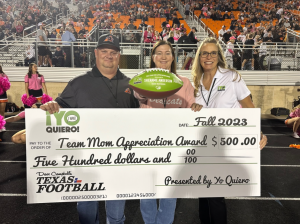Tyson Foods Names Callaway as CFO, Replacing John R. Tyson
 Tyson Foods, Inc. has named Curt Calaway chief financial officer, effective immediately. Calaway has been with the company since 2006, most recently serving as interim chief Ffnancial officer. Calaway will report directly to Donnie King, president and chief executive officer of Tyson Foods.
Tyson Foods, Inc. has named Curt Calaway chief financial officer, effective immediately. Calaway has been with the company since 2006, most recently serving as interim chief Ffnancial officer. Calaway will report directly to Donnie King, president and chief executive officer of Tyson Foods.
Calaway has nearly 30 years of experience in finance, audit and accounting. Prior to being named interim CFO, Calaway served as the CFO for Tyson Foods’ Prepared Foods Business Unit and was also responsible for the company’s Mergers & Acquisitions and corporate development efforts.
Calaway served as senior vice president of finance and treasurer, where he led Investor Relations, Treasury, Corporate Finance, Corporate Financial Planning & Accounting, M&A, Corporate Development and Supply Chain Finance. Calaway has held various leadership roles with the company during his 18-year tenure, including controller, chief accounting officer and vice president of audit and compliance.
“Curt is a proven leader with deep industry knowledge and a wealth of experience in financial strategy and reporting,” said King. “I am confident Curt will continue to help drive our operational excellence and shareholder value.”
Calaway succeeds John R. Tyson, who remains with the company but is on health-related leave.
For more news of interest to the food and beverage industry, subscribe to Gourmet News.
PorkRinds.com Presents 2nd ‘Crunch Time Hero of the Week’ Award
 PorkRinds.com, the nation’s premiere “hub” for pork rind lovers everywhere and home to top brands including Southern Recipe pork rinds, has announced its second annual collegiate sports celebration, dubbed the “Crunch Time Hero of the Week” award – a sponsorship program designed to highlight outstanding football players during the regular college football season. Through Nov. 30, a collegiate player who has a phenomenal play or a significant tackle during the regular season will be eligible for the “Crunch Time Hero of the Week” award.
PorkRinds.com, the nation’s premiere “hub” for pork rind lovers everywhere and home to top brands including Southern Recipe pork rinds, has announced its second annual collegiate sports celebration, dubbed the “Crunch Time Hero of the Week” award – a sponsorship program designed to highlight outstanding football players during the regular college football season. Through Nov. 30, a collegiate player who has a phenomenal play or a significant tackle during the regular season will be eligible for the “Crunch Time Hero of the Week” award.
The package includes notoriety and promotion as the pork rind “hero,” as well as a celebratory trophy and a generous supply of pork rinds to share with friends and family. Fans can learn more about the campaign and enter to win pork rind prizes at www.PorkRinds.com.
Each week, throughout the 13-game season, one football player will be chosen to win the “Crunch Time Hero of the Week” award, based on his previous weeks’ plays and tackles. At the end of the regular season, each of the 13 weekly winners will be eligible for the “Crunch Time Hero of the Year” award, which will be determined by a fan vote on PorkRinds.com.
PorkRinds.com sees this partnership as a unique opportunity to highlight the natural connection between pork rinds and football – pigskins simply go with pig skins. New this year, the “Crunch Time Hero of the Year” will be invited to attend bigger professional football media events as the collegiate season closes and the NFL season begins culminating in biggest game of 2025 in New Orleans.
“Just like our crunch time players make game-winning plays on the field, pork rinds are the best crunch time decision in the snack aisle,” said Mark Singleton, vice president of sales and marketing at PorkRinds.com. “The annual ‘Crunch Time Hero of the Week’ program is our celebration of the unsung heroes on the football field who get the job done.”
To join in on the fun, pork rind lovers and college football fans alike can learn about the weekly heroes and follow along at www.PorkRinds.com/CrunchTimeHero.
PorkRinds.com, a division of Rudolph Foods, is the e-commerce hub for pork rind aficionados everywhere. Created with the intention to help introduce pork rinds to the masses, PorkRinds.com offers a variety of pork rind brands that are naturally high in protein, low in carbohydrates and gluten free. For additional information and online ordering, visit https://PorkRinds.com/
For more news of interest to the snacks industry, subscribe to Gourmet News.
¡Yo Quiero! Celebrates Texas Football Team Moms
 ¡Yo Quiero! has partnered with Dave Campbell’s Texas Football to celebrate some of the most dedicated figures in Texas high school football: Team Moms! Throughout the season, ¡Yo Quiero! will be honoring moms who go the extra mile to support their teams. Nominations for the Team Mom of the Year can be submitted here: www.texasfootball.com/team-mom-appreciation-award/form.
¡Yo Quiero! has partnered with Dave Campbell’s Texas Football to celebrate some of the most dedicated figures in Texas high school football: Team Moms! Throughout the season, ¡Yo Quiero! will be honoring moms who go the extra mile to support their teams. Nominations for the Team Mom of the Year can be submitted here: www.texasfootball.com/team-mom-appreciation-award/form.
In the lead-up to the big award, 10 moms from across Texas will be recognized with the Team Mom Appreciation Award at games throughout the 2024 season. Each selected mom, who has made a positive impact on her community, will receive an award and a $500 donation to her school during the legendary Friday Night Lights, when Texas high school football takes center stage.
Tara Murray, VP of Marketing for ¡Yo Quiero!, said, “Texans should keep an eye out for ¡Yo Quiero! and the Dave Campbell’s Texas Football crew at games across the state as they honor these deserving individuals throughout the 2024 Texas high school football season!”
¡Yo Quiero! Brands, a family-focused dip company based in Rhome, Texas, is shaking up the national guacamole, salsa and queso category by offering everyone’s favorite dips packed with flavor, made with the fewest additives possible, and featuring quality better for you ingredients. “At the core of it all, we’re just trying to make it easier for families to enjoy their favorite foods together in a healthier way that moms love!” said Murray.
To learn more about the Team Mom Appreciation Award Program and Road Tour, visit here. “At the end of the year, fans will vote at texasfootball.com to help name the Team Mom of the Year,” added Murray.
For over 65 years, the iconic Dave Campbell’s Texas Football media brand has been “the bible” for millions of football fans across Texas. Its annual summer edition is essential reading for rabid football fans, previewing every high school and college team in the state. Known for its comprehensive coverage, TexasFootball.com offers extensive digital content, including team and recruit rankings, scores, exclusive interviews, podcasts, and daily shows. Additionally, TexanLive.com streams over 1,500 live sporting events each year, bringing fans closer to the action.
¡Yo Quiero! Brands is a Texas-based avocado, guacamole, and dip company with state-of-the-art facilities in Rhome, Texas and Guanajuato, Mexico. With a mission of selecting and growing the freshest and finest ingredients, ¡Yo Quiero! creates delicious, hand-crafted products that can be found in most local retailers. Bringing years of experience and dip expertise to the category, ¡Yo Quiero! leads and innovates with integrity and passion. The current lineup of premium handcrafted dips can be viewed on our website. For additional information, recipes, or product availability, please visit www.yoquierobrands.com
For more news of interest to the snacking industry, subscribe to Gourmet News.








